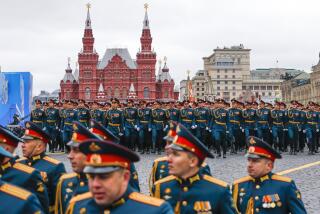Profile : Alfreds Rubiks: Latvia’s Agile Man in the Middle : His unsuccessful bid to seize power in the Baltic republic as the head of a pro-Moscow group hurt him politically at home. But the Kremlin seems to consider him the equal of the republic’s democratically elected president.
- Share via
RIGA, Soviet Union — The impish features of Alfreds P. Rubiks lit up with a bright and sudden smile. His American visitor wanted to know if he--Latvia’s Communist Party chief--was really the most disliked man in the entire republic.
“I consider in an even-handed sort of way the fact that I was popular once, and that now I am less so,” Rubiks, 55, replied. “You know,” he added cryptically after a pause, “I think my greatest popularity lies in the future.”
The reason for Rubiks’ faith became clear one week later. Acting “on the demand of the working people,” the All-Latvian Public Salvation Committee that Rubiks also chairs said it was seizing power in the republic and dissolving the Parliament and government, both of which want independence from the Soviet Union.
In what obviously was to be Rubiks’ big moment, the committee announced that it was forming a new government to replace the existing “bourgeois dictatorship.”
It had the makings of a textbook Leninist coup, in total violation of Soviet and Latvian law. But for reasons that are still murky, it failed. Unlike in neighboring Lithuania, where Soviet paratroopers were deployed on orders of a “National Salvation Committee,” causing the deaths of 13 unarmed civilians, no tanks raced to Rubiks’ aid.
In their attempt to grab power, both Baltic “Salvation Committees” had the backing of top Communist Party apparatchiks, military officers and influential conservatives in Moscow. Even Soviet President Mikhail S. Gorbachev’s original sympathies are unclear. It was only five days after the Latvian proclamation that the Soviet leader, hastily convoking the Moscow press corps, condemned the putsch tactics.
For Rubiks, something had gone badly wrong. In an interview with the progressive Soviet weekly newspaper, Argumenty I Fakty, Rubiks’ fellow Latvian conservative, Col. Victor I. Alksnis, is quoted as accusing Gorbachev of first approving the Baltic salvation committees, then turning his back on them after their coup attempts failed. “The president betrayed us,” Alksnis, an Air Force officer who is also a member of the Soviet parliament, was quoted as saying. “He is afraid to take responsibility himself. Imagine a surgeon starting a operation, making an incision in the body of a patient, and then leaving him.”
Whatever the Kremlin’s role, Rubiks’ botched attempt to oust Latvia’s pro-independence leaders will have sapped his popularity here even more, but he remains the central pro-Muscovite figure in this West Virginia-sized republic on the Baltic Sea. He also seems to have stayed in Moscow’s good graces. When Gorbachev received Latvian President Anatolijs Gorbunovs in the Kremlin last week (Jan. 21) to discuss what comes next for Latvia, the Soviet leader also had Rubiks attend as Gorbunovs’ evident equal.
Rubiks’ power base is a Latvian Communist Party now shrunken to a claimed 137,000 members, 39,000 fewer than a year ago. But he is also at the center of a web of pro-Soviet social organizations, which give him and his allies control over what goes on in key enterprises, the military and labor unions, whatever the policies and orders of Gorbunovs and Latvian Prime Minister Ivars Godmanis may be.
“Rubiks is the most hated man in Latvia. Maybe it’s overly emotional to say that, but many Latvians would agree,” Valdis Berzins, foreign news editor of the nationalist newspaper Atmoda, commented in a recent interview.
Since the abortive coup, posters have gone up on the streets of this ancient Hanseatic port depicting Rubiks as a sort of Latvian Saddam Hussein with his personal army, the Interior Ministry police force dubbed the “black berets.” Although Rubiks laughs at people who profess to see “the hand of Rubiks” in the Soviet SWAT team’s deeds, the black berets have acted in his objective interest. A defector from their ranks has said they obey orders from the Communist Party, and not from Latvia’s leaders.
For instance, earlier this month the black berets occupied the main newspaper publishing plant here to guard what Rubiks contends is Communist Party property, forcing out pro-independence publications in the process. On Jan. 20, members of the Interior Ministry SWAT team shot it out with loyalist Latvian police, and five people were killed.
Outraged at Rubiks’ pro-Moscow line, some of his countrymen call him “Kangara,” the name of a tribal leader who betrayed Latvia by siding with German invaders in the 13th Century. But to many ethnic Russians, Ukrainians and other migrants in Latvia--who comprise 48% of the republic’s 2.7 million population--the slightly-built, balding Latvian Communist is the best defender of their rights in the face of a burgeoning pro-secession movement.
During an interview at party headquarters here earlier this month, Rubiks evoked his vision of Latvia’s future and of Communists’ role in it. His remarks, it turned out, were a manifesto for pro-Kremlin forces in the Baltics and gave the ideological underpinnings of the shadowy “salvation committees.”
In typical Leninist style, Rubiks gives short shrift to the 1990 elections that awarded two-thirds of the seats in Latvia’s parliament to the pro-independence People’s Front. Despite the verdict of the ballot box, “progressive forces” led by the Communists have every right to demand that Latvia remain a part of the Soviet Union, he said.
With its neighbors, Lithuania and Estonia, Latvia lost its independence and was forcibly absorbed into the Soviet Union in 1940 after the Red Army marched in. Now, after more than a half-century of Soviet socialism, the restoration of independence has become a “crazy” dream, Rubiks asserts.
“We are a republic that doesn’t have any natural resources at all,” Rubiks said. “We are tied to all the (Soviet) republics. Destroy all that, and it would mean the death of industry.”
In Rubiks, Latvia’s pro-separatist forces know they have a talented adversary. He was mayor of Riga, a city of more than 900,000 people, for six years until 1990. He began his tenure with something of the reputation of a radical. “I was more popular than (beloved Latvian songwriter and pianist) Raymond Pauls,” he recalls fondly.
As mayor, Rubiks forfeited much of that popularity by trying, unsuccessfully, to build a subway that environmentalists and local activists said would have endangered the medieval quaintness of the Baltic port’s Old Town.
Intriguingly, Rubiks’ fate made him identify with Soviet power while he was just a small boy. His father Peter was killed while fighting with the Red Army in the first days of the World War II, when Alfreds was 5. His mother remarried, and the boy’s stepfather also went off to war--as a member of the Latvian Legion of the Nazi SS.
His stepfather’s pro-Nazi affiliations and postwar internment by the Red Army caused Rubiks repeated problems during the xenophobic last years of Josef Stalin’s reign. But, Rubiks said, because he did not try to hide what his stepfather did, his honesty was acknowledged and he was allowed to join the Communist Party in 1959.
“I believe that you cannot persecute a person for his political views,” Rubiks declared. “It’s another thing if somebody calls for the violent overthrow of the authorities of the state in which he lives.”
He seemed very sincere. But a week later, Rubiks’ committee was proclaiming the demise of Latvia’s duly elected government and accusing pro-independence lawmakers of complicity with an “alternative pro-fascist power structure.”
With the collapse of the putsch, Rubiks’ profession of tolerance for his opponents never had to be put to the test.
The patent failure of the Salvation Committees to oust pro-independence regimes in the Baltic republics or to force Gorbachev to impose direct rule from Moscow probably dooms them as institutions and discourages the formation of similar groups in other separatist-minded republics. Last Friday, the Lithuanian group, which never made public the names of its members, announced that it was suspending its activity.
Even if the “Salvation Committees” do disappear, however, Rubiks and the other Soviet loyalists in the outlying republics will still have a powerful panoply of institutions at hand to use in combating secession drives, including the KGB, the military, the Communist Party, and police units like the black berets.
During a recent visit to Moscow, Rubiks saw the Russian-dubbed version of “Gone With The Wind” and loved it. Much like the Southern gentlemen who rode off to defend their way of life in the 1860s, Rubiks intends to fight for the existence of the Latvian Soviet Socialist Republic.
“Those defects that the socialist road led to in Eastern Europe and to a certain degree in Soviet society can be a tragedy for the life of one generation, but in the eyes of history, well, it’s only a dead end that should not be pursued any further,” Rubiks said. “We now need to seek another way to socialism.”
More to Read
Sign up for Essential California
The most important California stories and recommendations in your inbox every morning.
You may occasionally receive promotional content from the Los Angeles Times.













